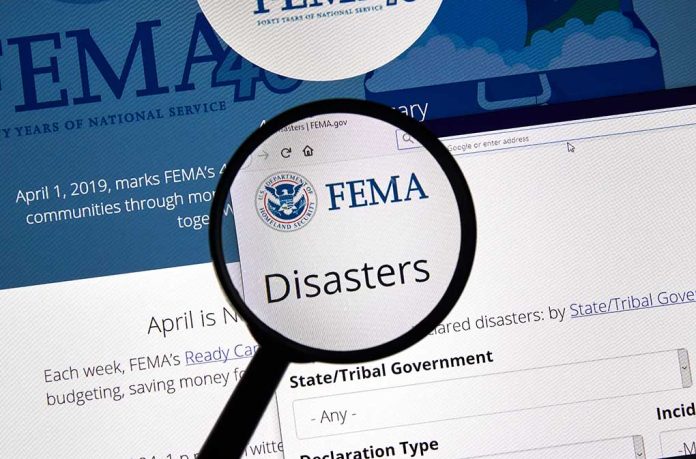
The Federal Emergency Management Agency faces profound financial challenges during this active hurricane season, significantly affecting its disaster response capabilities.
At a Glance
- FEMA’s resources are severely drained due to Hurricane Helene.
- A bipartisan group is urging immediate action from Congress.
- More funds are critical for effective disaster response.
- Local resiliency is tested as communities await aid.
Financial Constraints Challenge FEMA
Hurricane Helene’s devastation, particularly in Florida and the Southeast, left a trail of destruction resulting in more than 160 fatalities. FEMA’s financial resources are significantly strained as a result, as Homeland Security Secretary Alejandro Mayorkas pointed out, leaving the agency vulnerable amid the ongoing hurricane season.
FEMA has been actively involved in search-and-rescue operations across Appalachia facing severe destruction. The agency’s Disaster Relief Fund is at risk of depletion, despite receiving $20 billion in funds via a short-term bill.
.@FEMA_Deanne traveled to Florida to survey #Helene's damage & assess additional needs.@POTUS approved emergency declarations in AL, FL, GA, NC, SC & TN, allowing federal resources to flow immediately as damage assessments are conducted.
🔗 https://t.co/8Rh5NCtvgY https://t.co/UGjiiPJYvQ
— FEMA (@fema) September 28, 2024
Homeland Security Secretary Alejandro N. Mayorkas has sounded the alarm on FEMA’s
financial situation, stating that the agency lacks the necessary funds to manage the remainder
of the hurricane season effectively. The severity of the situation has prompted discussions about
potential legislative measures to secure additional disaster relief funds.
Legislative Measures and Immediate Needs
President Biden and Vice President Harris are visiting affected regions to reinforce their commitment to recovery efforts. As of this writing, more than 150,000 households have sought FEMA assistance. The President approved major disaster declarations; however, Mayorkas has indicated that additional legislative support is essential for rebuilding and recovery efforts.
Congress and a bipartisan assembly are emphasizing swift measures to secure the necessary funds. Suggestions for a supplemental spending bill are under discussion but require immediate attention to avert adverse impacts.
Community Response and Resilience
In certain areas like Asheville, North Carolina, community-driven responses have emerged due to the slow federal assistance. With roads blocked, essentials like food, water, and gas remain inaccessible, leading regions like Cruso and Canton to self-rely for survival.
“We’ve never depended on them before. Why should we depend on them now?” said Amber Capps, the president of the Cruso Community Center. “We’re independent.”
Support from neighboring states, including aerial delivery via helicopters and planes, is crucial. Relief supplies are reaching central distribution hubs, though isolated regions remain without full access. The disaster underscores the growing need for robust infrastructure and timely monetary support.
Sources:
- Mayorkas warns FEMA doesn’t have enough funding to last through hurricane season
- Mayorkas Warns of Funding Shortfall for Rest of Hurricane Season
- This Hurricane Season May See a Key FEMA Disaster Fund Run Out of Money
- After Flooding, FEMA Aid Is Arriving. But Some Are Still on Their Own.
- Helene Survivors’ Next Battle: A Ragged Federal Disaster Recovery System
- Tornadoes, Floods and Hurricanes Loom, but the Government Is Running Out of Money to Help
- FEMA Goes Into Hurricane Season Low on Funds – For 2nd Straight Year






















